The Dark Knight Rises Explained: Unraveling The Unanswered Questions

The Dark Knight Rises doesn’t toss out as many wild theories as Prometheus, which we had a lot of questions about last month, and doesn’t leave nearly as much to the imagination as Inception, which we spent months discussing back in 2010. But a lot of us still walked out of The Dark Knight Rises unclear on how a few things went down, and going over our questions together, we figured we’d bring the conversation to the group.
So, before we get started, and it should go without saying-- SPOILERS FOR THE DARK KNIGHT RISES FOLLOW. YOU HAVE BEEN WARNED.
Now let’s dig into some of the nagging questions that still get to us, whether they were answered elsewhere in the film or are left as complete mysteries. For some of them we’ve come up with what seem like pretty reasonable answers, but for others, your guess is as good as ours. And if you have questions we didn't tackle already, let us know in the comments and we may add them. Let's get this movie figured out!
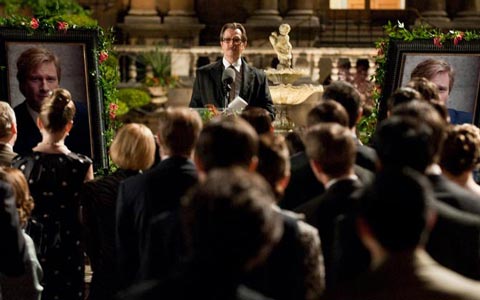
Why did Gordon still have his speech about Harvey Dent in his jacket?
You’re preparing to give an incendiary speech, one that would indict the man the city views as a hero and try to exonerate who they believe is the villain. You’re all prepared to give it, but then you back out at the last minute, knowing what you say could rip the city apart. Are you really going to just stuff that speech back into your pocket and forget about it? Wouldn’t you do your best to make sure that speech is destroyed, and that it could never fall into the wrong hands?
In defense of Commissioner Gordon, we’ve all put things in our jacket pockets and only rediscovered them months later. But his careless mistake is one with huge consequences-- Bane finds it when he apprehends Gordon a day later, then uses the speech to bring Gotham to its knees, aiding in his total takeover of the city. That’s a pretty huge consequence for a piece of paper that someone as savvy as Gordon should have known to burn the minute he stepped away from that podium on Harvey Dent Day.
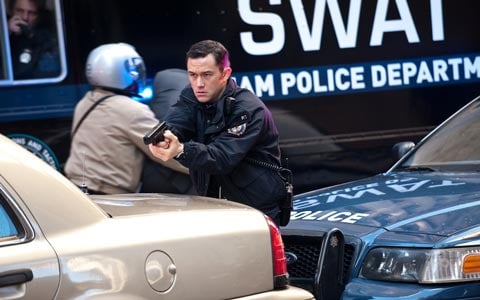
Why did ALL of Gotham’s cops go underground to investigate Bane’s plot?
Your Daily Blend of Entertainment News
Commissioner Gordon knew Bane's forces were growing underground, brewing an unimaginable terrorist threat to Gotham and its residents. But so long sidelined by his injury and the blind ambition of Deputy Commissioner Foley, Gordon makes a brash decision, demanding "everyone" on the police force go into the sewer system in search of Bane's militia. When Bane's bombs cause cave-ins that trap countless officers and murder the Mayor, the people of Gotham are left essentially defenseless with no authority to turn to, which makes the city easy pickings.
However, whoever passed down Gordon's directive clearly had enough sense not to throw every single member of the police force underground, leaving a skeleton crew to handle the day-to-day cop duties in Gotham. Some of these included top brass like Gordon and Foley, who form a resistance movement with "hot head" newly promoted Detective John "Robin" Blake. But there were more than just these few. Some presumably went into hiding as Foley attempted before Gordon risked his own neck in his quest to get him to join the charge. And we learn the fate of others through a warning the priest gives Blake about roving mobs "hunting down" cops to throw before Scarecrow's merciless kangaroo court.
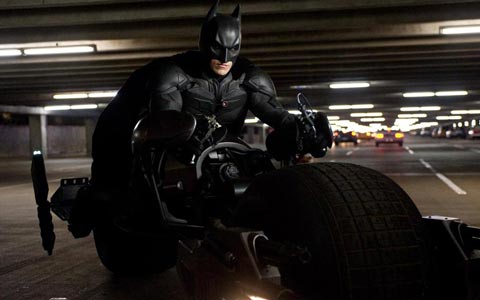
How did Batman have time to escape the nuclear blast when we saw him in the Bat’s cockpit with 5 seconds to go on the clock?
This was the key point in the piece we wrote yesterday, wondering if when Alfred sees Bruce Wayne at a Florence cafe with Selina Kyle, he’s not just imagining the happy ending for his adopted son. Because while Lucius’s discovery about the autopilot, and the fact that Bruce had time to leave instructions for John Blake, all line up to saying he lived, there’s still no explanation of how he could have time to eject from the Bat-- when we clearly see him in the cockpit with 5 seconds to go on the bomb’s timer.
There aren’t even any hints to how this works in the movie, so the best we can do is just guess. Maybe he ejected into the water, soared down with the Bat-suit cape and landed in safety. Maybe he had one of the Wayne Industries submarines waiting for him, and that’s how he managed to travel the many miles through water back to Gotham to pick up Selina. Or it might be that the edit is a cheat, that Batman is nowhere near the cockpit of the Bat when there are 5 seconds let on the clock, and Nolan bent the rules a bit to give us a real shock when the Bat blew up. Basically the only answer that sticks is “He’s fucking Batman. He figured it out.”
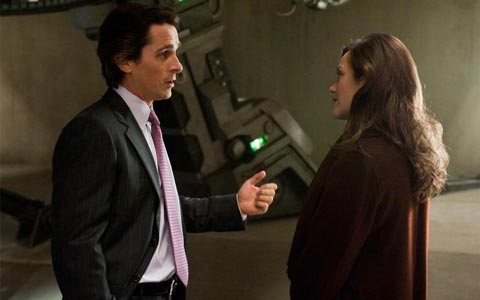
How did both Batman and Bruce Wayne go missing for so long with nobody connecting them?
The answer is that Bruce Wayne wasn’t gone for the full eight years. While it is fact that he doesn’t put on the cape and cowl again after the death of Harvey Dent, that wasn’t his last night as billionaire playboy Bruce Wayne. In The Dark Knight Rises we learn that Bruce teamed up with Miranda Tate on a clean energy project for Wayne Enterprises that involved the building of the fusion reactor that a large chunk of the movie is set around. Because the project began to malfunction, the entire thing was shut down and both our hero and Miranda lost a great deal of money.
While some might argue that Lucius Fox, the CEO of Wayne Enterprises, was dealing with the business end of things with Tate, it’s clear from the beginning that Miranda and Bruce are close. The people of Gotham believe that Wayne went into hiding and became a Howard Hughes-esque figure because of this failed project and don’t see any correlation between the two disappearances. If anything, people should have found it strange that Bruce Wayne returned to town in Batman Begins at the same time as Batman’s first appearance. You can’t ask one question without the other.
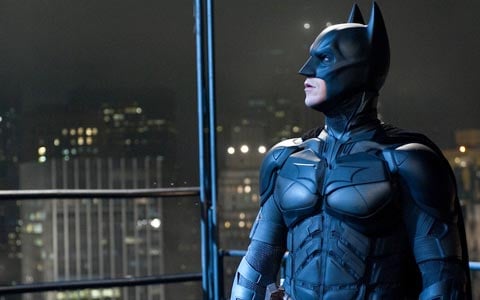
How did Bruce Wayne get from the prison back to Gotham?
The Dark Knight Rises is plenty long without adding in an extended sequence of how Bruce Wayne hitches rides on goat trucks in Albania, does some itinerant farming to earn his keep on some Czech farm, hops into the cargo section of an airplane in Frankfurt and finally sneaks his way across the last remaining bridge leading to Gotham, all in order to surprise Commissioner Gordon out on the ice. He gets from point A to point B; do you really need the details?
But as someone else has suggested, an entire Planes, Trains and Automobiles-style movie about Bruce’s journey from Albania to Gotham would be pretty great, especially if he had to team up with a slobby John Candy-type to get there (maybe it was the Penguin!) But the only answer to this question, really, is “He’s Batman. He figured it out.” That’s kind of disappointing given the rigorous realism of Nolan’s Batman universe, but this kind of grey area is where fan fiction flourishes, so get ready for tons of theories on this very question for years to come.
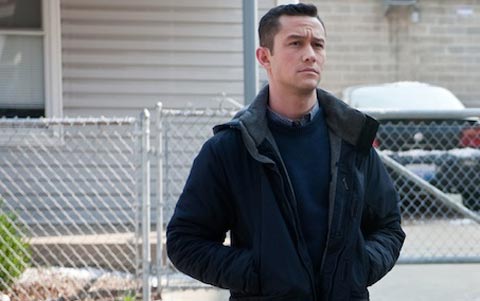
How does John Blake know Bruce Wayne is Batman?
He just does, OK? This is a particularly clunky bit of exposition. Blake explains to Wayne that they met once, when the young cop was a simple orphan … much like Bruce was at one point. His exact quotes escape me, but basically, he just knew Wayne was Batman. No explanation. It’s the equivalent of Metropolis citizens not recognizing Clark Kent as Superman because he wears glasses! Only Blake’s smart enough to see through this ruse. That’s why he’s such a good cop.
Commissioner Gordon must be a terrible cop, then, because he can’t figure it out. He needs to be reminded of that time he put a coat on a little boy’s shoulders to finally make the connection. (As if Gordon would remember such an insignificant action out of the countless times he has had to help citizens of Gotham in the past.) But Blake? He just knows. End of story.
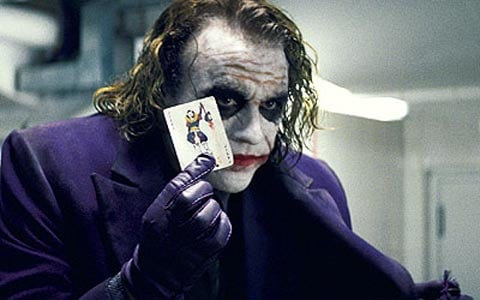
What happened to The Joker?
We knew going into the film that The Joker would not be seen in The Dark Knight Rises (poor Christopher Nolan had to answer that particular question about 30,000 times), but the fact that the character isn’t even mentioned actually creates a hole on some level. In the movie, Bane is seen breaking all of the convicts out of Blackgate Prison and the fact that Jonathan “Scarecrow” Crane is serving as judge in the martial state court is indication that the crazies in Arkham Asylum found their way back into society. So why aren’t the people of Gotham clawing their eyes out at the thought of The Joker being back on the streets?
The easiest answer is that The Joker is dead. Whether it happened while he was hanging in front of the heavily-armed SWAT team at the end of The Dark Knight (maybe one of the cops didn’t feel he deserved the judicial system) or while he was locked up with the other homicidal loonies in Arkham, if the clown prince is dead it would easily explain why nobody thinks to ask about him in The Dark Knight Rises.
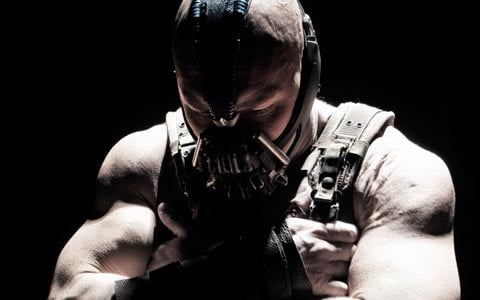
What does Bane’s mask actually do?
You mean, “Besides making him sound ridiculous?” It’s a good question, and one Tommy Carcetti … um, Aidan Gillen asks Bane in the middle of the airplane heist. But Bane’s answer is vague. Much like his motivations throughout the rest of the film. From what we can tell, his mask helps him cope with pain that stems from the beatings he took in the pit. But how? Even though it looks like a mask one would wear in a hospital, there’s no tube leading from a gas tank to Bane’s mask. And at different points in the film, Tom Hardy stomps around without a shirt, so there’s nothing in Bane’s vest or stylish jacket that’s funneling painkillers to the bony mask. Late in the movie, when Batman shatters the mouthpiece, it seems to slow Bane down. It has been suggested that there could be capsules of painkillers stashed somewhere in the bulky mask, but couldn’t Nolan have included one shot of Bane changing out a depleted capsule and refreshing his supply, if that was the case?

Eric Eisenberg is the Assistant Managing Editor at CinemaBlend. After graduating Boston University and earning a bachelor’s degree in journalism, he took a part-time job as a staff writer for CinemaBlend, and after six months was offered the opportunity to move to Los Angeles and take on a newly created West Coast Editor position. Over a decade later, he's continuing to advance his interests and expertise. In addition to conducting filmmaker interviews and contributing to the news and feature content of the site, Eric also oversees the Movie Reviews section, writes the the weekend box office report (published Sundays), and is the site's resident Stephen King expert. He has two King-related columns.
